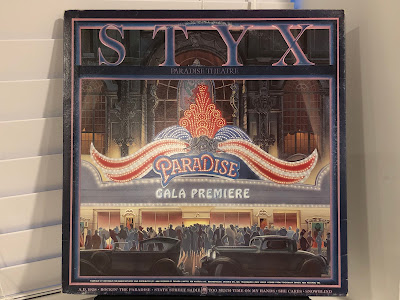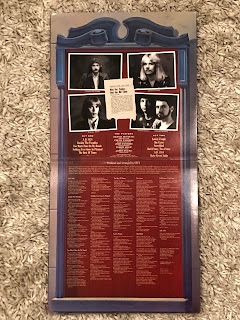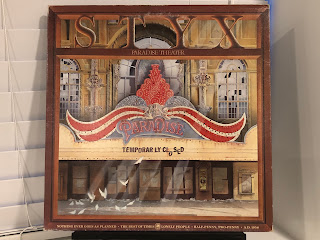The band had been setting a gruelling pace, releasing an album a year (two in 1972) and by the time they released Paradise Theater (if I end up writing theatre later it's because that's how we spell it here) in 1981 they'd dropped ten albums in less than a decade. I snapped this up as soon as I saw it, and it became a fixture on my turntable.
Like the band had announced on "Borrowed Time" from 1979's Cornerstone, "Don't look now, but here come the '80s!" The '80s were indeed here, and Styx dropped an album that still felt like Styx but there were changes. They were still rocking, but some of the rough edges had been softened, and this was almost a pop album. Oh those strangely unique Styx backing harmonies that could only have come out of the '70s were present in abundance, but now this was a melding of genres.
The album opens with "A.D. 1928" a short piano ballad before the band kicks in with "Rockin' the Paradise" a song that served as a calling card to those who doubted Styx's ability to kick ass. This was followed by the now classic "Too Much Time on My Hands" with Tommy Shaw on vocals. The opening synthesizer sequence before kicking in, confirmed we were indeed in the '80s. I did play this to death back in the day, and kind of wore it out, but listening to it now it's as cool as ever. Besides, the guitar solo still melts my face.
Then the first of the subtle stylistic changes hits, "Nothing Ever Goes as Planned" is Dennis being as theatrical as ever. I can't quite place what this was supposed to be as it meandered from pop to pseudo-reggae. When the horn section kicks in the song levelled up, and with a killer solo the song it was a cherry on top. I'm still surprised this one worked and didn't collapse under it's own weight.When "The Best of Times" started with the same progression as the album's opener "A.D. 1928" I remember thinking, "What is going on?" Then the song continues and before you could say "Babe I'm leaving" the song had turned into a full fledged ballad, but unlike the previously mentioned song that shouldn't be mentioned, there was something about this one that worked - I mean really worked.
So far this was really good.
Flipping the vinyl over, I'd forgotten the record was embossed with the Styx logo. Man, that was cool. The second side starts with "Lonely People" and again there are horns ... lots of horns, and then the song settles down to a mid tempo groove with Dennis on lead vocals. Now I'll be frank, this was never a song I liked that much, but in the context of the album I never picked up the needle to skip the track. Besides buried in this five minute head scratcher was a fantastic middle section where the keyboards and lead guitar play off each other before the solo kicks in, and it's a song unto itself.
Hmm. I see I'm prattling off one song at a time, so I guess I'll keep going. "She Cares" is another Tommy Shaw piece and while I'd always been partial to Tommy's singing, this was a song that just felt to smooth and kind of awkward, I mean is there a clunkier line than this in a pop song? "And still she treats me like a human." The song itself was sort of just there and served as a stop gap before getting to the first of the James Young songs on the album.
"Snowblind" or as my youth group leader proclaimed, "The love song to cocaine" was a killer song mired with James vocals. I wish I knew what it was about his voice that irritated me. I used to say it was because he sounded like a Broadway singer trying to sing in a rock band. Which is hardly fair or accurate as Dennis had the same sort of voice. The thing is James wrote killer music, and here where lead vocals are shared with Tommy, the album finally unleashes the rock. As a guitar slinger, I don't think James ever really got his due.
Case in point, "Half-Penny, Two-Penny" I mean this is an absolutely killer riff. The song also plays with the progressive elements that were present at the start of "Lonely People" before the song literally stops so that the guitar solo can take the spotlight. It's also the song where I learned what a gold Krugerrand was. See, you can learn things from music. The song serves as the closer to the album before seamlessly going into "A.D. 1958" and knitting the two sides together.
Styx always felt very much like Dennis' band, at least creatively and on Paradise Theatre, he wrote and sang the majority of the songs. To me it never felt like an unequal partnership as more often than not Tommy's contributions were highlights and even Jame's who I liked to piss on, always pulled off something with an amazing riff and was musically awesome - even if I was lukewarm to his vocals.
Paradise Theatre was an extraordinary album, and truly the best of times. Like so many bands from the '70s there was a bit of bleed over into the '80s, and honestly the band was at the top of their game how could things not continue?
Dennis had his hold my beer moment with Kilroy Was Here a couple years later and that marked the end of the classic era.



Comments
Post a Comment